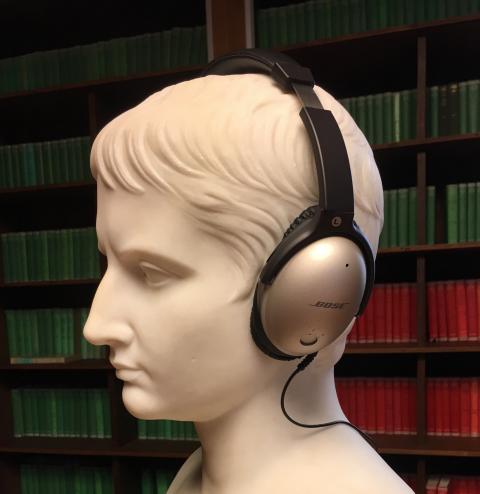Alison Innes
May 15, 2017
Podcast listening is more popular than ever. Data from the large Infinite Dial survey shows steady yearly growth in the share of adults over 12 who have listened to at least one podcast. In 2016, 36% reported having done so, for an estimated 96 million people nationwide. The time is therefore right for classicists to embrace this medium for public engagement.
While podcasting takes time and preparation and may have a steep learning curve, it is very rewarding. Research interests come alive in a new way when you create and share your ideas via podcasting. Listener responses will help you develop your ideas in new directions. [pullquote]Podcasting also breaks down academia’s walls, creating a wider audience and inviting the public to see what scholars do and why it matters.[/pullquote]
When Darrin Sunstrum proposed we start MythTake in April 2016, I didn’t know much at all about making a podcast. I listened to podcasts and I knew what I liked, but the tech side of things seemed daunting and I had never thought of making a podcast myself. We started MythTake without much of a plan. We knew what we wanted to talk about and I knew vaguely how to use GarageBand, so we bought a microphone, plugged it in, and hit record. I would like to share some of what we have learned about the process of creating a podcast during the 20 episodes we have produced.
Listen to podcasts
The first step to making a good podcast is listening to good podcasts! Reflect on what it is about your favourite podcasts that you like, consider how the podcast is structured, and how the host(s) keep your interest. Find new podcasts by searching hashtags like #humanitiespodcasts or #podernfamily on Twitter. NPR has also launched a special hashtag, #trypod, to promote podcast awareness.
Find your topic, voice, and audience
When you’re thinking about a podcast topic, reflect on what you can add to the conversation. If a podcast on your topic already exists, how will you differentiate yourself? We were fortunate with MythTake that no one else was doing exactly what we wanted to do. There are other podcasts about Greek mythology, but no one else was having a conversation focused on textual analysis.
Pick a partner or go solo
Most podcasts have one or two hosts; some have three or more. There are a number of advantages to sharing the duties of host among two or more people. The work of research, writing, and recording each episode can be distributed across the group, so that no one person is responsible for an episode. In addition, each host will have their own particular areas of interest that they like to explore, so the listener gets a nice mix of subjects. While having cohosts divides the work, it is critical that they have great chemistry. Tensions between hosts can seep into the finished product, so you want to podcast with someone who’s one the same wavelength!
Try a style
Some podcasters use scripts, some don’t, and there are pros and cons both ways. Using a script helps keep your podcast on track and makes the editing process much easier, but it can be challenging to ensure you never sound like you’re reading. Your choice of topic may help determine your style. Ryan Stitt of History of Ancient Greece Podcast follows the approach that most podcasters take by writing a script in advance. Greek history, he says, is too dense and full of details to wing it. Trojan War: The Podcast with Jeff Wright is at the other end of the spectrum. Wright focuses on knowing his script as opposed to memorizing it. Wright is a professional storyteller and is used to performing alone, on stage, for two hours without cue cards; his podcast is an extension of those performances. After writing his script, he records it and listens to it multiple times, then revises and listens some more. It’s a lengthy and time-consuming process, but Wright says that it permits him to give a much better performance. With MythTake we take a conversational approach. We have our passages prepared ahead of time, as well as a list of points that we know we want to talk about. We decide who is going to lead which bits of the conversation, but we don’t write out a full script.
Plan your time commitment
A big consideration in podcasting is time. Researching, writing, recording, producing, promoting—it eats up a lot of time. Releasing episodes at regular intervals will keep your audience engaged and may help search algorithms in podcast distributors such as iTunes or GooglePlay. External commitments may influence how frequently you can podcast, though. We aim to release a new MythTake episode every two weeks, but as independent podcasters, Darrin and I fit MythTake among work and other life commitments. We are both employed in academia and some months are busier than others, which can affect our schedule; we also do longer episodes, so the gap between new episodes is sometimes longer. Shorter episodes are a great way to explore a very focused idea; complex ideas can be developed over multiple episodes. Aim to create episodes that listeners can enjoy individually, even if they are a part of a larger series. Podcasts are about fun, not homework!
A lengthy list of classics-related podcasts, including websites, can be found on David Meadows blog. My own contributions are available on my blog.Thank you to the #humanitiespodcasts community for creating and sharing their work and patiently answering my questions about their methods!
(Header image: Past Progressive, by Meagan Ayer. Licensed under CC BY-SA 3.0).
Authors


